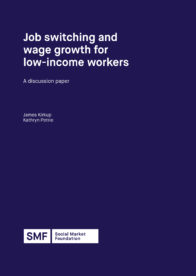This paper draws upon a Social Market Foundation roundtable held in early-March 2020. Whilst the economic context has changed considerably, long-run issues surrounding wage growth - and disparities between job switchers and stayers - are likely to remain unchanged.
Executive summary
- Switching jobs can lead to wage progression and evidence predating the Coronavirus pandemic suggests that the wage boost received by workers who switch jobs, relative to the wages of those who do not, is growing. Given Britain’s problems of persistent low pay, policymakers should give more focus to how job switching might be a route to pay progression for low-income workers.
- Aggregate data on switching among all workers conceals significant variation by income groups. Workers on lower incomes who switch are likely to receive smaller income increases than those on higher incomes – and may experience negative wage growth.
- The reasons for these differentials in economic experience of switching are still currently unclear, and should be investigated in more depth. Those differentials strongly suggest the labour market is working differently for people at different income levels. This is likely to be unfair and potentially inefficient.
- Workers in the groups and industrial sectors most likely to experience persistently low pay – especially women and part-time workers – appear to be less likely than others to switch, and less likely than other switchers to enjoy significant wage gains from switching.
- Non-wage factors may play a significant role in the switching behaviour of such workers, and in their wage outcomes from switching. Again, this should be further investigated.
- Particular focus should be put on women who work part-time on low wages and the importance of working patterns in decisions to switch or not switch jobs. Difficulties and/or worries over transferring family-friendly working patterns may be hindering the pay progression of some of these women. Policymakers should give more thought to policies that would make it easier for low-wage part-time workers to transfer their working patterns between jobs. A situation where women are trapped in low-income jobs because of problems transferring suitable working patterns to alternative, better-paying jobs should be addressed by policymakers and employers.
- Evidence suggests that low-income workers may be unlikely to make significant geographical moves to switch jobs and increase their wages. Pay-progression policy should put more emphasis on the importance of local labour markets.
- Higher skills can make it easier for a low-income worker to move to a higher-paid job but our anecdotal evidence suggests some employers see little benefit in helping to provide training and may even see the linkage between training and employers moving as a reason not to offer training. Coupled with evidence that employer-provided training is heavily skewed towards higher-wage workers, this supports the argument that greater attention be given to the wider, fairer provision of training for working-age adults.

Download The Report: PDF
Kindly sponsored by

